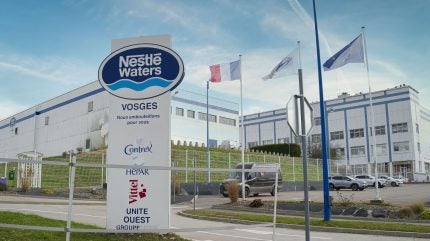
The French government covered up information regarding Nestlé’s bottled water production in France, the findings of the country’s Senate inquiry have found.
In its conclusions, the Senate said: “The commission concludes that the presidency of the Republic knew, at least since 2022, that Nestlé had been cheating for years, was aware that this created a distortion of competition with other mineral producers and was aware of bacteriological and even virological contamination in certain drilling operations.”

Discover B2B Marketing That Performs
Combine business intelligence and editorial excellence to reach engaged professionals across 36 leading media platforms.
In January last year, Nestlé admitted to breaching regulations in France regarding how it treats bottled mineral water against contamination.
“In addition to Nestlé Waters’ lack of transparency, it is necessary to highlight the State’s lack of transparency both towards local and European authorities and the French people,” the Senate report said.
From 31 August 2021 to 29 January 2024, the European Commission was not informed about the practices taking place in Nestlé’s waters business, the Senate said, “even though a European directive requires it to be informed in the event of difficulties with natural mineral water”.
“This concealment, including with regard to local authorities, is part of a deliberate strategy, discussed at the first interministerial meeting on natural mineral waters on October 14, 2021. Nearly four years later, transparency has still not been achieved.”

US Tariffs are shifting - will you react or anticipate?
Don’t let policy changes catch you off guard. Stay proactive with real-time data and expert analysis.
By GlobalDataThe Senate added that the approval granted for the use of microfiltration under the 0.8 micron threshold came from “the highest level of government”.
Earlier this month, Nestlé was asked by French authorities to remove system filters from its Vergèze and Vosges sites in the country, which produce bottled water brands such as Perrier and Contrex.
The group’s waters business unit told Just Drinks at the time it was “determined to seek solutions to the requests of the Prefects of the Gard and Vosges” to remove a “0.2 micron microfiltration” system “within two months”.
It said in a brief statement a “technical solution” had already been found for the Vosges location, which will impact Contrex and Hépar, but the plan still “must be validated by authorities”.
The investigation, which ended this month, saw more than 70 hearings take place, some of which included Nestlé CEO Laurent Freixe and Ronan Le Fanic, the global head of technical and production at Nestlé Waters.
Fanic has since been suspected of perjury in his hearing. The Senate has referred “false testimony” matter to the Paris prosecutor.
Reacting to the Senate’s report today, a Nestlé spokesperson said: “We take note of the conclusions presented by the French Senate Committee of Inquiry on practices in the bottled water industry, underlining common challenges for mineral bottlers today and the need for greater clarity and consistency in the application of the regulatory framework.
“With food safety as a primary goal, the company reiterates that all its natural mineral water products on the market have always been and remain safe to drink, and their unique minerality is as shown on the label.
“The company welcomes the Committee of Inquiry’s focus on protecting the unique heritage of France’s mineral water resources – a matter of critical importance for all players in the natural mineral water industry. Nestlé Waters has a long-standing commitment to preserving water resources at all its sites through concrete initiatives carried out in close collaboration with local stakeholders – such as those already in place in the Gard and Vosges regions in France.”
During his hearing in April, Freixe told French senators the company would be starting an internal audit of its water production in France.
Speaking to the Senate, he said the review would take “a few months” to complete and that it was “essential if we are to learn all the lessons we need to, and I will draw all the necessary conclusions from it”.
In his opening remarks, Freixe said its waters division had been informed about an “unfavourable opinion” from a hydrogeologists’ report on the continued use of wells for natural mineral water production at its Vergèze facility in the Gard region of southern France.
According to Le Monde in January 2024, Nestlé reportedly used disinfectants “due to sporadic bacterial or chemical contamination”, which are not permitted under French law on products labelled as ‘spring’ or ‘mineral’ water.
In a statement, Nestlé then said it used “microfiltration at [its] waters sites at a finer level than was previously recognised by the French authorities”.
“We have also used activated carbon filters and ultraviolet systems which, though permitted by other jurisdictions, are not in line with applicable French natural mineral water regulations,” Nestlé added.
It said it had “proactively” reported this to the French authorities in 2021 and “presented them with several options to ensure compliance moving forward”.
The following September, the group agreed a settlement and €2m ($2.2) fine with French authorities over claims of breaching laws on mineral water and illegal drilling.





